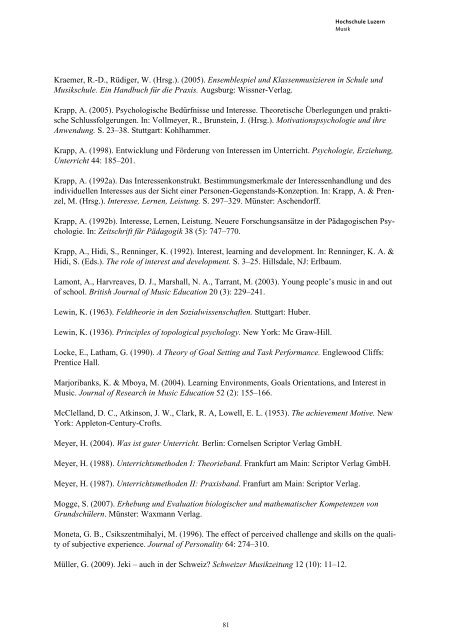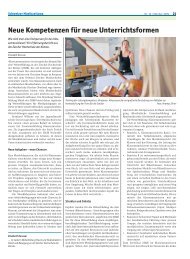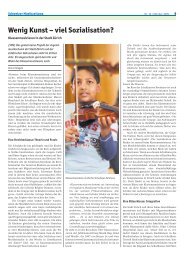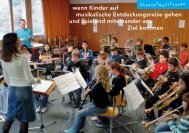Kraemer, R.-D., Rüdiger, W. (Hrsg.). (2005). Ensemblespiel <strong>und</strong> <strong>Klassenmusizieren</strong> in Schule <strong>und</strong>Musikschule. Ein Handbuch für die Praxis. Augsburg: Wissner-Verlag.Krapp, A. (2005). Psychologische Bedürfnisse <strong>und</strong> Interesse. Theoretische Überlegungen <strong>und</strong> praktischeSchlussfolgerungen. In: Vollmeyer, R., Brunstein, J. (Hrsg.). <strong>Motivation</strong>spsychologie <strong>und</strong> ihreAnwendung. S. 23–38. Stuttgart: Kohlhammer.Krapp, A. (1998). Entwicklung <strong>und</strong> Förderung von Interessen im Unterricht. Psychologie, Erziehung,Unterricht 44: 185–201.Krapp, A. (1992a). Das Interessenkonstrukt. Bestimmungsmerkmale der Interessenhandlung <strong>und</strong> desindividuellen Interesses aus der Sicht einer Personen-Gegenstands-Konzeption. In: Krapp, A. & Prenzel,M. (Hrsg.). Interesse, Lernen, Leistung. S. 297–329. Münster: Aschendorff.Krapp, A. (1992b). Interesse, Lernen, Leistung. Neuere Forschungsansätze in der Pädagogischen Psychologie.In: Zeitschrift für Pädagogik 38 (5): 747–770.Krapp, A., Hidi, S., Renninger, K. (1992). Interest, learning and development. In: Renninger, K. A. &Hidi, S. (Eds.). The role of interest and development. S. 3–25. Hillsdale, NJ: Erlbaum.Lamont, A., Harvreaves, D. J., Marshall, N. A., Tarrant, M. (2003). Young people’s music in and outof school. British Journal of Music Education 20 (3): 229–241.Lewin, K. (1963). Feldtheorie in den Sozialwissenschaften. Stuttgart: Huber.Lewin, K. (1936). Principles of topological psychology. New York: Mc Graw-Hill.Locke, E., Latham, G. (1990). A Theory of Goal Setting and Task Performance. Englewood Cliffs:Prentice Hall.Marjoribanks, K. & Mboya, M. (2004). Learning Environments, Goals Orientations, and Interest inMusic. Journal of Research in Music Education 52 (2): 155–166.McClelland, D. C., Atkinson, J. W., Clark, R. A, Lowell, E. L. (1953). The achievement Motive. NewYork: Appleton-Century-Crofts.Meyer, H. (2004). Was ist guter Unterricht. Berlin: Cornelsen Scriptor Verlag GmbH.Meyer, H. (1988). Unterrichtsmethoden I: Theorieband. Frankfurt am Main: Scriptor Verlag GmbH.Meyer, H. (1987). Unterrichtsmethoden II: Praxisband. Franfurt am Main: Scriptor Verlag.Mogge, S. (2007). Erhebung <strong>und</strong> Evaluation biologischer <strong>und</strong> mathematischer Kompetenzen vonGr<strong>und</strong>schülern. Münster: Waxmann Verlag.Moneta, G. B., Csikszentmihalyi, M. (1996). The effect of perceived challenge and skills on the qualityof subjective experience. Journal of Personality 64: 274–310.Müller, G. (2009). Jeki – auch in der Schweiz? Schweizer Musikzeitung 12 (10): 11–12.81
Naegele, V. (2009). Wenig Kunst – viel Sozialisation? Schweizer Musikzeitung 12 (10): 9–12.Nagy, G. (2005). Berufliche Interessen, kognitive <strong>und</strong> fachgeb<strong>und</strong>ene Kompetenzen: Ihre Bedeutungfür die Studienfachwahl <strong>und</strong> die Bewährung im Studium. Dissertation. Berlin: Freie Universität Berlin.Nicholls, J. G. (1975). Causal attributtions and other achievement-related cognitions: Effects of taskoutcom,attainment, value and sex. Journal of Personality and Social Psychology 31: 379–389.Nolting, H.-P., Paulus, P. (1999). Psychologie lernen. Eine Einführung <strong>und</strong> Anleitung. Weinheim <strong>und</strong>Basel: Beltz Verlag.Novak, T. P., Hoffman, D.L., Yung, Y.-F. (2000). Measuring the Flow construct in online environments:A structural modeling approach. Marketing Science 19 (1): 22–42.Nunnally, J.C. & Bernstein, I.H. (1994). Psychometric theory. New York: McGraw-Hill.OECD (2007). International Migration Outlook. Annual Report. SOPEMI.Oerter, R. (1995). Entwicklung der <strong>Motivation</strong> <strong>und</strong> Handlungssteuerung. In: Oerter, R. & Montada, L.(Hrsg.). Entwicklungspsychologie. S. 758–822. München: PVU.Pilke, E. M. (2004). Flow experiences in information technology use. International Journal of Human-Computer Studies 61: 347–357.Reinhard, G. (1981). Leistungsmotivation im musikalischen Bereich. In: La Motte-Haber, H. de(Hrsg.). Beiträge zur Systematischen Musikwissenschaft. Bd. 6. Hamburg: Verlag der MusikalienhandlungKarl Dieter Wagner.Remy, K. (2000). Entwicklung eines Fragebogens zum Flow-Erleben. Diplomarbeit. Bielefeld: Fakultätfür Psychologie <strong>und</strong> Sportwissenschaft der Universität Bielefeld.Rheinberg, F. (2006). Intrinsische <strong>Motivation</strong> <strong>und</strong> Flow-Erleben. In: Heckhausen, J. & Heckhausen,H. <strong>Motivation</strong> <strong>und</strong> Handeln. S. 331–354. Heidelberg: Springer Medizin Verlag.Rheinberg, F., Vollmeyer, R., Manig, Y. (2005). Flow-Erleben: Untersuchungen zu einem populären,aber unterspezifizierten Konstrukt. Potsdam: Psychologisches Institut der Universität Potsdam. [ElektronischerArtikel unter http://opus.kobv.de/ubp/volltexte/2006/715/pdf/ rheinberg_abschlussbericht_flow_erleben.pdf(25.01.2010)].Rheinberg, F. (2004). <strong>Motivation</strong>sdiagnostik. Göttingen: Hofgrefe.Rheinberg, F., Vollmeyer, R., Engeser, S. (2003). Die Erfassung des Flow-Erlebens. In: Stiensmeier-Pelster, J. & Rheinberg, F. (Hrsg.). Diagnostik von <strong>Motivation</strong> <strong>und</strong> Selbstkonzept. S. 261–279. Göttingen:Hogrefe.Rheinberg, F. (2002). <strong>Motivation</strong>. Stuttgart: Kohlhammer.Rheinberg, F., Vollmeyer, R., Burns, B. D. (2001). QCM: A questionnaire to assess current motivationin learning situations. Diagnostica 47: 57–66.82
- Seite 1 und 2:
Tito Bachmayer/Rainer PeterKlassenm
- Seite 3 und 4:
AbstractMit mittlerweile über sech
- Seite 6 und 7:
Inhaltsverzeichnis1 Ausgangslage 12
- Seite 8:
10.2.10 Übersicht 10: Präferenz f
- Seite 11 und 12:
ten und geordneten Wissens „über
- Seite 13 und 14:
Die eigentliche empirische Untersuc
- Seite 15 und 16:
treten - verzichtet wurde, um Schü
- Seite 17 und 18:
Während beim Aufgebenden Verfahren
- Seite 19 und 20:
dass bei bestimmten, vor allem krea
- Seite 21 und 22:
Im Gegensatz zu älteren Ansätzen
- Seite 23 und 24:
stark generalisierten Motive („tr
- Seite 25 und 26:
ser Umgang steht in enger Abhängig
- Seite 27 und 28:
Schliesslich gilt zu beachten, dass
- Seite 29 und 30:
verwendeten wir diese FKS mit 10 It
- Seite 31 und 32:
ewusst, dass eine Befragung der akt
- Seite 33 und 34:
5.2.3 Aufbereitungs- und Analysever
- Seite 35 und 36:
Eltern/ Bildungsniveau** Berufsstat
- Seite 37 und 38:
sikkonsum: Die Hälfte der Kinder d
- Seite 39 und 40: Übersicht 3: KM-Aspektkombinatione
- Seite 41 und 42: derungspassung (Balance zwischen F
- Seite 43 und 44: Betrachten wir den positiven Flow-Z
- Seite 45 und 46: Grafik 3: Auftretenshäufigkeit von
- Seite 47 und 48: Flow-Erleben (FKS)KM-Klasse Inhalt
- Seite 49 und 50: Bezüglich Flow-Erleben innerhalb d
- Seite 51 und 52: stärkerem Flow am geringsten bzw.
- Seite 53 und 54: Wichtigkeit an vierter bzw. dritter
- Seite 55 und 56: InhaltUnterrichtsformUnterrichtsmet
- Seite 57 und 58: se und Flow: Die im Total durchschn
- Seite 59 und 60: che von den Musikschülern ausgepr
- Seite 61 und 62: zelspiel hatte von allen 64 Schüle
- Seite 63 und 64: verschiedenen Zeitpunkten zu je zwe
- Seite 65 und 66: Etwas weniger nannten die Kinder da
- Seite 67 und 68: 7.2.2 Interessen und KM-AspekteIn d
- Seite 69 und 70: * KM-Aspekte: (N) = Notenspiel, (I)
- Seite 71 und 72: an der Musikschule auch ein Thema,
- Seite 73 und 74: „Also, in der ganzen Klasse ist e
- Seite 75 und 76: onsklasse war beim Jungen denn auch
- Seite 77 und 78: kontrastierend zum Flow) vor. In ei
- Seite 79 und 80: icht, die sich in Verbindung mit so
- Seite 81 und 82: senmodell am besten dazu imstande i
- Seite 83 und 84: schlechterstereotyp. Das stärkere
- Seite 85 und 86: Instruktive und konstruktive Unterr
- Seite 87 und 88: Bourdieu, P. (1979). La Distinction
- Seite 89: Ganzeboom, H. & Nagel, I. (2002). P
- Seite 93 und 94: Titscher, S., Meyer, M. Wodak, R. &
- Seite 95 und 96: 10.1.2 Fragebogen 2a: Interesse fü
- Seite 97 und 98: Falls ja, wer spielt ein Instrument
- Seite 99 und 100: 10.2.3 Übersicht 3: KM-Aspektkombi
- Seite 101 und 102: 10.2.6 Übersicht 6: Untersuchungsa
- Seite 103 und 104: 10.3.2 Tabelle 2: Profil hinsichtli
- Seite 105 und 106: 10.3.6 Tabelle 5b: Besorgnis und An
- Seite 107 und 108: 10.3.8 Tabelle 6b: Auftretenshäufi
- Seite 109 und 110: 10.3.10 Tabelle 8a: Flow-Erleben na
- Seite 111 und 112: 10.3.12 Tabelle 8c: Anforderungspas
- Seite 113 und 114: 10.3.14 Tabelle 9b: Flow-Erleben un
- Seite 115 und 116: 10.3.16 Tabelle 9d: Anforderungspas
- Seite 117 und 118: 10.3.19 Tabelle 10c: Besorgnis und
- Seite 119 und 120: 10.3.21 Tabelle 11a: Flow bei Schü
- Seite 121 und 122: 10.3.23 Tabelle 11c: Besorgnis und
- Seite 123 und 124: 10.3.25 Tabellen 12a-b: Lieblingsf
- Seite 125 und 126: 10.3.28 Tabelle 15a: Lieblingsfäch
- Seite 127 und 128: 10.3.32 Tabelle 16b: Lieblingsinstr
- Seite 129 und 130: 10.3.36 Tabelle 19: Interesse und K
- Seite 131 und 132: 10.3.39 Tabelle 22: Aktuelle Motiva
- Seite 133 und 134: 10.3.41 Tabelle 24: Flow-Erleben, I
- Seite 135 und 136: 10.3.43 Tabelle 26: Flow-Erleben, I
- Seite 137 und 138: 10.4.3 Grafik 3: Auftretenshäufigk





